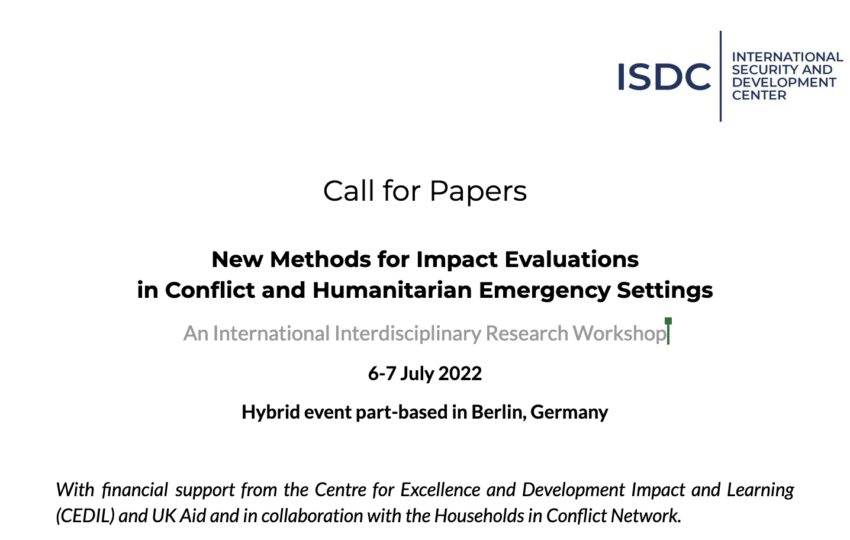Call for Papers
New Methods for Impact Evaluations
in Conflict and Humanitarian Emergency Settings
An International Interdisciplinary Research Workshop
6-7 July 2022
Hybrid event part-based in Berlin, Germany
With financial support from the Centre for Excellence and Development Impact and Learning (CEDIL) and UK Aid and in collaboration with the Households in Conflict Network.
ISDC – International Security and Development Center invites submissions of research papers (including work in progress and working papers) for a workshop on new methods for rigorous impact evaluations of interventions in conflict and humanitarian emergency settings to be held in a hybrid format in Berlin on 6-7 July 2022.
The two-day workshop will bring together social science researchers conducting rigorous impact evaluations of socio-economic or health interventions in humanitarian and conflict-affected settings to present their cutting-edge research methods, exchange expertise, provide feedback, and discuss the current state of the art of research on methods. The call for papers is now open. Priority will be given to interesting discussions of new data and quantitative methods for these settings, rather than findings. Submissions may either focus on the exclusive discussion of data and methods or the novel use of data and methods as part of a larger empirical investigation. We do not wish to discuss as such which interventions work and which ones do not work in conflict settings.
Specifically, papers could address any of the following themes but may also address other related themes on data and methods for impact evaluations in conflict settings:
- Data: Face-to-face data collection in humanitarian settings can be challenging. However, the availability of big data promises to bring new innovations for conducting impact evaluations. The theme will discuss the potential, and the pitfalls, of drawing on low-cost remote surveys, geo-referenced data, administrative data, and remotely-sensed data.
- Designing evaluations: Conflict requires researchers to adapt existing approaches such as experimental, quasi-experimental, adaptive-iterative, or phase-in research designs in humanitarian context. The theme will discuss what elements of such approaches work and how challenges in implementing them can be overcome without losing rigour.
- Measurement: In emergency settings we may need to adapt what and how we measure intended and unintended outcomes, often resulting in multi-disciplinary survey instruments. The theme will address how to adapt measurement outcomes related to food security, nutrition, welfare, behaviour, social cohesion, stability, and peacebuilding.
- Methods: Machine learning tools are increasingly becoming more accessible to researchers and practitioners. The theme will address how new methods in machine learning can be applied for not just assessing impact evaluation but also for targeting and deriving missing data.
The workshop sessions will be structured around these four themes. Speakers are expected to make clear contributions to at least one of these themes.
The call is aimed at researchers working in any academic discipline and at any level of seniority. We encourage doctoral students and postdoctoral researchers to apply to participate in the workshop. Please note that we prefer papers that are near completion to maximise the opportunity for feedback. We will also consider submission in early stages if they make a strong contribution to one of the themes above in their current format (in that case, please send an extended abstract).
Please send your submission by 10 May 2022 to Sarah Haffar at ISDC at the email address events@isdc.org. The submissions should be in English. Please also attach a short CV in pdf format and state if you wish to attend in person or virtually. Authors of accepted submissions will be notified by 17 May 2022.
Papers at the workshop may be considered for publication in the HiCN Working Paper series.
There is no workshop fee. We have limited funding to cover the attendance costs for some participants, such as travel and accommodation. If you any require financial support, please note this clearly in your submission.



